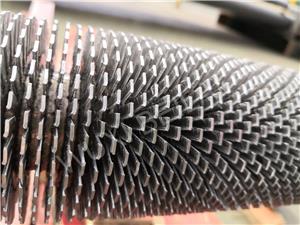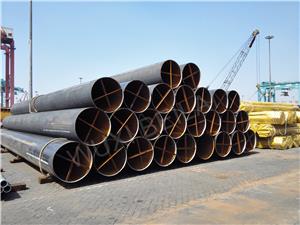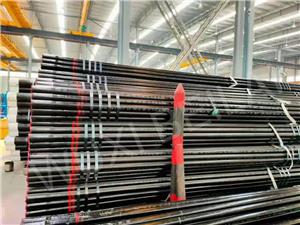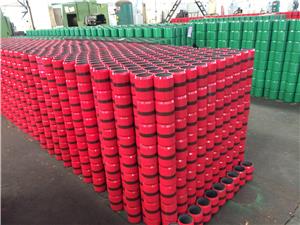Understanding the Manufacturing Process of Steel Pipes
Today we're going to talk about the manufacturing process of steel pipes.Steel pipes, whether they are used for infrastructure, energy or industrial purposes, it's also important to understand the manufacturing process behind them.We'll cover everything from raw materials to advanced manufacturing techniques, along with environmental factors and quality control.
What is a steel pipe?What are the types of steel tubes?
Steel pipes, or steel tubes, are hollow cylindrical structures made primarily from steel, a material known for its strength, flexibility, and durability. These pipes come in two main forms: seamless pipes and welded pipes. Seamless pipes are formed from a single piece of steel without any joints, while welded pipes are created by joining two pieces of steel through welding.
What are some common applications for steel pipes?
Steel pipes are essential across a variety of industries. In the oil and gas sector, they transport fluids like oil, natural gas, and water over long distances. In construction, steel pipes form part of the structural framework, foundations, and plumbing systems of buildings and infrastructure. Additionally, steel pipes are crucial in HVAC (Heating, Ventilation, and Air Conditioning) systems, where they transport air and other gases.
What raw materials are used in the manufacture of steel pipes?
The production of steel pipes relies on a few key raw materials, each chosen for its specific properties:
- Iron Ore: Iron ore is the primary material from which steel is derived. It is processed to extract iron, which forms the base of the steel used in pipes.
- Carbon Steel: Carbon steel, known for its strength and excellent weldability, is the most commonly used material in steel pipe production.
- Alloying Elements: In addition to carbon, elements like manganese, nickel, chromium, and molybdenum are added to steel to improve properties such as corrosion resistance, hardness, and heat resistance.
What are the main raw materials?
Choosing the right materials is crucial for the desired application of the steel pipe. For example, pipes used in corrosive environments require higher alloy content to withstand degradation. A carefully selected blend of materials ensures the pipes meet specific operational needs, enhancing their performance and lifespan.
Steel Pipe Manufacturing Process
The manufacturing process of steel pipes involves several stages, including the preparation of raw materials, the formation of the pipes, and finishing procedures.
Step 1: Raw Material Preparation
The process begins with extracting iron ore, which is processed into steel through furnaces that melt and purify the material. The molten steel is then cast into billets or coils, which serve as the base for pipe formation.
Step 2: Pipe Formation
Steel pipes are formed through two primary methods:
- Seamless Pipes: These are created by piercing a solid billet to form a hollow tube. The billet is heated and stretched through a process called elongation, followed by finishing operations to achieve the required dimensions.
- Welded Pipes: In this process, steel plates or coils are shaped and then welded together using techniques such as Electric Resistance Welding (ERW) or Submerged Arc Welding (SAW). After welding, the pipe undergoes further processing, including sizing and heat treatment.
Step 3: Pipe Finishing
Once the pipes are formed, they undergo heat treatment, such as annealing, quenching, or tempering, to improve mechanical properties. Surface preparation methods, like shot blasting or pickling, are employed to remove impurities and ensure smooth finishes.
Quality Control and Advanced Manufacturing Techniques
Quality Assurance
Throughout the manufacturing process, stringent quality control measures are implemented to ensure the final product meets industry standards. These measures include dimensional checks, visual inspections, and non-destructive testing (NDT) methods such as ultrasonic and radiographic testing. These tests help identify defects that could compromise the pipe's performance.
Advanced Manufacturing Techniques
Modern technologies, including ERW and SAW, enhance the efficiency and precision of the manufacturing process. ERW uses electric currents to join steel edges, while SAW employs an electric arc and flux to create strong, durable welds. These advanced techniques allow for the production of pipes with larger diameters and specific customer requirements, improving overall production speed and product quality.
Environmental Considerations
Impact of Steel Pipe Manufacturing on the Environment
Like any industrial process, steel pipe manufacturing has environmental implications. The production of steel consumes significant energy, and the extraction of raw materials can lead to environmental degradation. Additionally, emissions from furnaces and steel processing plants contribute to greenhouse gases.
Sustainable Manufacturing Practices
To mitigate these effects, manufacturers are adopting more sustainable practices, focusing on energy efficiency, resource optimization, and waste reduction. Techniques such as recycling steel scrap and utilizing renewable energy in production processes are becoming increasingly common, reducing the environmental footprint of steel pipe manufacturing.
Recycling and Reuse of Steel Pipes
Steel pipes are highly recyclable, making them an ideal candidate for reuse. When they reach the end of their lifecycle, steel pipes can be melted down and repurposed for new products, thereby conserving natural resources and lowering energy consumption. Recycling also helps reduce greenhouse gas emissions, making it a critical component of sustainable manufacturing.
Steel tubes play a key role in several industries and are known for their high strength, durability and corrosion resistance.The performance of steel tubes is guaranteed by the selection of high-quality raw materials and the use of cutting-edge technology.




